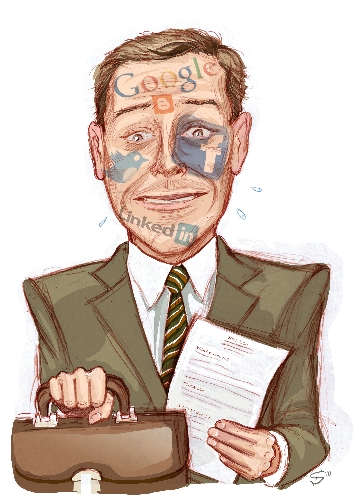Being too chatty on social networking sites can cause personal, work woes
Michele Cababe recently shared some good news with her friends via a Facebook status update: "Finally got my bonus."
As far as personal revelations go, the statement wasn't that big of a deal. But Cababe nearly lost her job over it.
"My boss said it was insulting for me to post something like that on Facebook," Cababe recalls. "He said it was unfair because not everyone got a bonus. I was told to leave for the day and he would call to tell me if I could come back."
Ultimately, she kept her job, although she has since gone to work for another company. And she learned a social media lesson that an increasing number of people are learning the hard way: Be careful what you write on the Internet because it can come back to haunt you.
Cababe had only five co-workers on her friends list, all of whom she trusted with personal details. She also had marked her profile "private" in Facebook's privacy settings. She took the appropriate steps experts recommend for keeping personal information out of the wrong hands. Still, her boss heard about the comment.
The only way to prevent something you write online from hurting you is to not write it, says Craig Henderson, a local attorney with Bailey Kennedy law firm. Henderson, who has a degree in computer science and once worked as a programmer, is an expert in social media ethics for attorneys.
"I think what makes these sites so amazing is the way they can disperse information around the world instantaneously," Henderson says. "But that also makes them dangerous. As soon as you post it, everyone is seeing it and you can't get it back."
Even if you delete it, there's a good chance that what you've written online has been stored, permanently. Twitter, Facebook and other social media sites sell their posts to search engines, Henderson says. If someone is searching for a topic that you wrote about, it could be included in search results.
"You have to be careful about what you post, and think about it before you post it," Henderson says. "You never know who's going to see it."
Social networking can impact a person's job, as Cababe's experience shows. It can not only get you fired, it also can prevent you from getting hired in the first place, says Bill Werksman, managing partner of the executive search firm Resource Partners.
Employers are within their rights to use social media as a hiring tool, Henderson says.
That's why Werksman suggests keeping Facebook for friends and using another site, such as Linkedin, for professional networking. And, despite what your privacy settings are on Facebook, use discretion when posting pictures and comments that are racy or extreme to either side of an issue. Don't join groups that may offend certain groups or cultures, Werksman adds.
"I'd say within the last couple of years, it's been pretty much assumed if you apply for a job, you're going to get Googled," Henderson says. "If it's something you don't want anyone to see, don't post it."
Ruth Furman, owner of Image Words, a local public relations and marketing firm, uses her Facebook page to keep up with friends, family and clients.
When she signed up for an account with Facebook, she posted frequently about her life and business. It was sort of addictive and Furman admitted she was guilty of being overzealous, at first. She quickly learned to rein in the personal sharing, especially details about her weight loss or participation in 5K runs, hikes and other events.
"On my way home from a run last June, I remember seeing comments on Facebook that horrified me. One was a comment honing in on certain physical attributes," says Furman, who rushed home and deleted the embarrassing comment.
Since then, she makes sure to monitor her page for anything that could be considered offensive to her and to others. The wrong comment can sour a friendship or even a business relationship, she says.
Once she deleted a comment in which a poster used the word "retard." Furman's brother has Down syndrome.
"A lot of people use that word, they don't think it's very offensive," she says. "I don't want to sound like a Facebook cop, but I'm really careful about what's appropriate."
It's easy to get caught up in the moment and write something casual or flippant, but what may be casual to one person could be sarcastic or raunchy to another, Furman says. And those people are forming opinions about you based on your comments.
"Everyone feels the pressure to be funny," Furman says. "We all want to be clever and pithy in any form of communication and we all should. But I think we can be pithy and witty without being offensive."
Sometimes, a few written words on a social networking site can go beyond offensive and land the writer in legal trouble. That's why it's important to be aware of your rights and exercise restraint online, Henderson says.
The First Amendment guarantees a right to freedom of speech, Henderson says. The right is so broad that almost anything an individual writes online is protected unless you accuse a person of being unfit or question their character. That includes falsely accusing someone of engaging in illicit sexual activity or questioning a person's fitness for their profession, he adds.
And while that means you can call someone an "idiot" online and get away with it, the question is, should you?
"Is it worth it to get sued for defamation or get fired from your job or ruin a personal friendship because you posted something that half an hour later you wish you hadn't?" Henderson asks.
Contact reporter Sonya Padgett at spadgett@ reviewjournal.com or 702-380-4564.




























